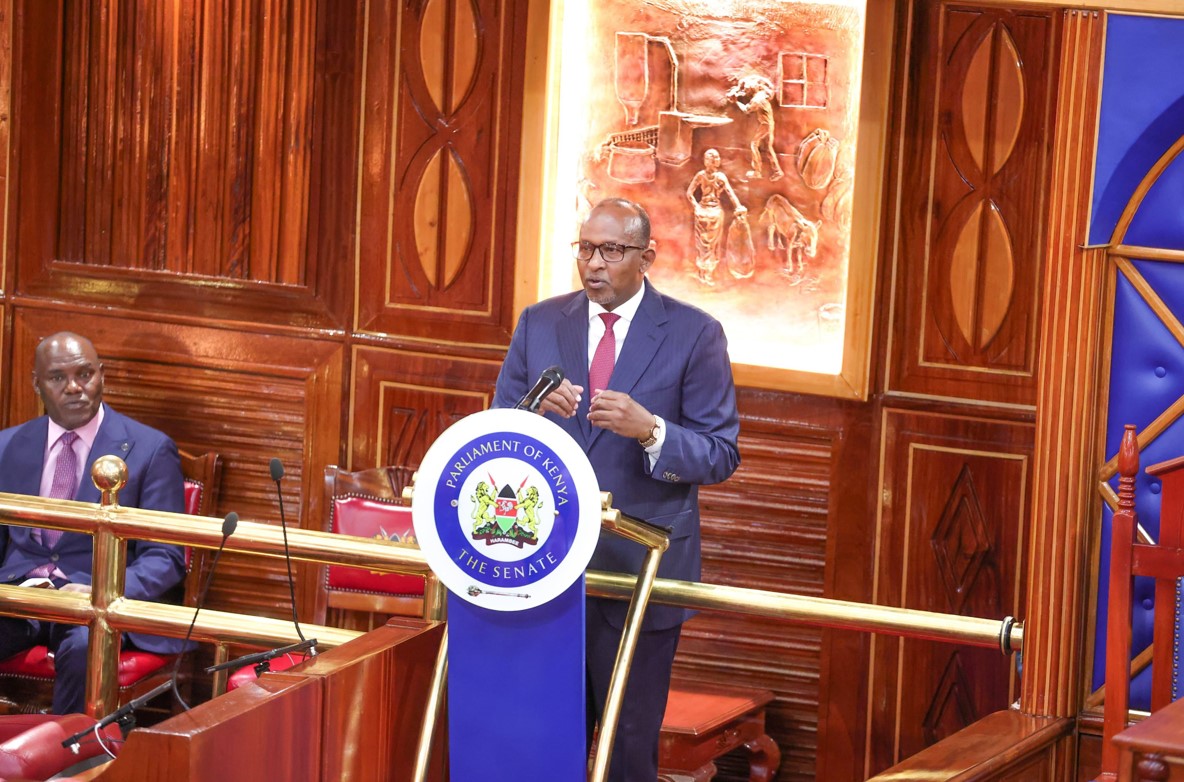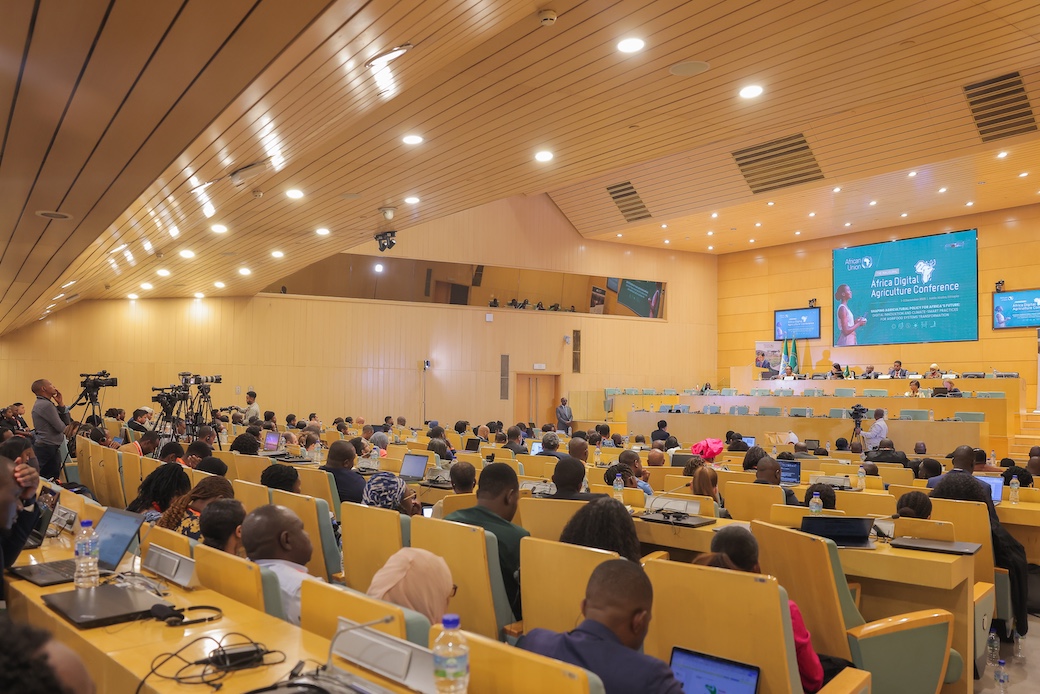CS Duale reaffirms stance against miraa and muguka, wants them banned

The Defence CS noted that Kenya should not jeopardise the health and future of its youth to the benefit a few "self-centred" individuals profiting from trade in miraa and muguka.
Defence Cabinet Secretary Aden Duale has waded into the ongoing debate on the ban against the stimulants miraa and muguka, calling for their prohibition due to associated health risks.
The CS reiterated the Kenya Kwanza government's commitment to combating drug abuse.
More To Read
- Governors sound alarm as 934 newborns die amid funding row in health sector
- Over 160 newborns, 14 mothers died during Kiambu doctors’ strike - Health CS Aden Duale
- Health Ministry rolls out new oxygen equipment to hospitals
- Health Ministry tops list of NHIF debtors with Sh7.8 billion owed- RUPHA
- Duale explains shift from Linda Mama to maternal package under SHA
- Miraa Bill sparks debate over public health concerns, livelihoods in Wajir
"As leaders, we have a moral duty to steer the country in the right direction. During my tenure as a parliamentarian, I took a bold and unpopular stand against the proposal to legalise miraa as a cash crop in Kenya. We must not jeopardise the health and future of our youth," he added in a post on social media platform X.
In May 2023, the National Authority for the Campaign against Drug Abuse (NACADA) classified miraa as a drug. A survey report by NACADA listed miraa among the top drugs and substances of abuse among 15- to 65-year-olds, with more than 960,000 users.
The World Health Organisation (WHO) classified miraa as a drug of abuse in 1980, noting its potential to cause dependence. Countries that have banned miraa include the United Kingdom, Sweden, Norway, Denmark, and the Netherlands.
The CS noted that Kenya should not jeopardise the health and future of its youth for the benefit of a few "self-centred" individuals profiting from the trade in miraa and muguka, which he termed dangerous substances.
"Miraa, like other psychotic drugs, is an addictive stimulant that poses significant risks to mental and physical health. Legalising it would only exacerbate issues of substance abuse, undermining our efforts to combat drug addiction and safeguard the productivity of our young people," he said.
This is not the first time Duale has voiced his concerns about miraa.
In September 2020, while serving as Garissa Township MP, Duale delivered a passionate speech in Parliament, warning of the negative impacts of miraa on society. He highlighted the socio-economic and familial damages caused by the substance and called for accountability regarding funds allocated to provide miraa farmers with alternative crops.
"There are producers and consumers. I have the right to speak for consumers. This thing has destroyed people, let us be very honest. Even if Parliament made a mistake, we want to correct it," Duale noted.
"When the government formed a task force, one recommendation was to give farmers an alternative to miraa farming," Duale said.
As leaders, we have a moral duty to steer the country in the right direction.
— Hon. Aden Duale, EGH (@HonAdenDuale) June 1, 2024
During my tenure as a parliamentarian, I took a bold and unpopular stand against the proposal to legalize Miraa as a cash crop in Kenya.
We must not jeopardize the health and future of our youth to… pic.twitter.com/yZIthejBgK
Moral and religious implications
In June 2016, former President Uhuru Kenyatta appointed a 14-member Task Force on the Development of the Miraa Industry. Chaired by Geoffrey Nchooro M'mwenda, it was given three months to complete its mandate, which included proposing ways to regain lost markets and find new ones for Miraa.
The report recommended that the government sensitise law enforcement officers on the status of miraa and the legitimacy of trade in the produce. It also proposed that the Miraa Traders Association ensure members are informed on the need to be licensed
Duale pointed out, however, the moral and religious implications of miraa, emphasising that the government has a moral duty to protect its people.
His sentiments came amid a debate on whether the sale and consumption of muguka in Kenya should be banned.
Three counties in the coastal region banned muguka's sale and distribution. This decision by Governors Abdulswamad Nassir (Mombasa), Andrew Mwadime (Taita Taveta), and Gideon Mung'aro (Kilifi) didn't please leaders from Embu, where muguka is grown.
They said the stimulant isn't as harmful as the governors claim, and banning it would harm farmers who depend on it.
President William Ruto stepped in to help all sides find a solution but declared the ban by the three counties null and void, citing laws and regulations passed with the backing of the Council of Governors (CoG).
Nevertheless, a section of leaders from Northern Kenya also want the stimulant banned.
Muslim religious leaders have also called on the region's governors to throw their weight behind Kilifi and Mombasa counties in support of the muguka ban.
The Supreme Council of Kenya Muslims (SUPKEM) chairman in Garissa county, Abdullahi Salat, said on Tuesday that the drug has crippled development in the region, perennially eroding the moral fabric of their society.
He commended the courageous steps taken by the governors of Mombasa and Kilifi and urged Northern Kenya governors to follow suit.
"We want governors from Garissa, Wajor, Mandera, Isiolo, Tana River, and Marsabit, to follow that example, and that drug should be banned in these counties because it has affected the health, education, and resources of our people," Salat noted.
Top Stories Today
















































